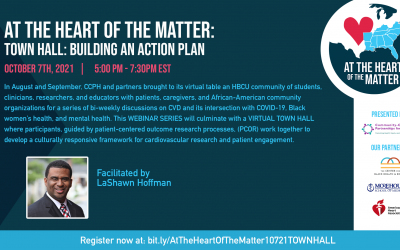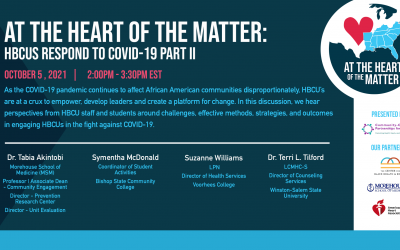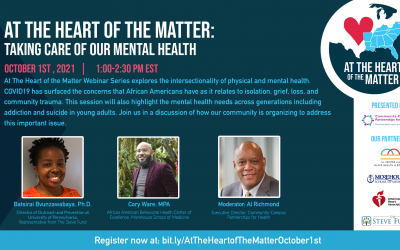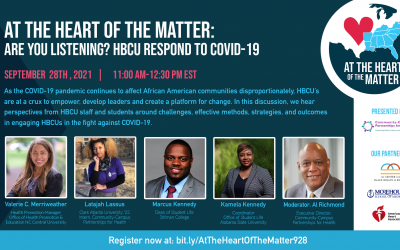At the Heart of the Matter:
Developing an Action Plan
At the Heart of the Matter exists to engage HBCU researchers, patients, and advocacy organizations in cardiovascular research, intersection with COVID-19, Black women’s health, and mental health. (from ideation to dissemination and implementation) and engagement of patient-centered outcome research (PCOR).
Upcoming At the Heart of the Matter Virtual Event Series
At The Heart of the Matter Town Hall: Building an Action Plan
Are you an HBCU stakeholder? We invite you to join us THURSDAY, October 7th, 2021 for: At The Heart of the Matter Town Hall: Building an Action Plan Date & Time:October 7th, 2021 from 5:00 pm - 7:30pm EST Description:In August and September,...
At the Heart of the Matter: HBCUs Respond to COVID-19 Part II
Join us for: At the Heart of the Matter: HBCUs Respond to COVID-19 Part II Date & Time:October 5th, 2021 2:00-3:30 pm EST Description:As the COVID-19 pandemic continues to affect African American communities disproportionately, HBCU’s are at a crux to...
At The Heart of the Matter: Taking Care of Our Mental Health
Join us for: At The Heart of the Matter: Taking Care of Our Mental Health Date & Time:October 1st - 1:00-2:30 pm EST Description:At The Heart of the Matter Webinar Series explores the intersectionality of physical and mental health. COVID19 has surfaced...
At the Heart of the Matter Virtual Event Series: Are you listening? HBCU respond to COVID-19
Join us for: At the Heart of the Matter Virtual Event Series: Are you listening? HBCU respond to COVID-19 Date & Time:September 28th, 2021 at 11:00 AM-12:30 PM EST Description:As the COVID-19 pandemic continues to affect African American...
People involved in the program
At the Heart of the Matter is a partnership between CCPH, Morehouse School of Medicine, the American Heart Association, The Center for Black Health Equity, and South Carolina State University. This continual partnership will convene HBCUs in the southeast region and their community partners to address cardiovascular disparities using the patient-centered outcome research (PCOR) framework.
Research supported by the program
The project’s aim is to engage Historically Black Colleges and Universities (HBCU) researchers, patients, and advocacy organizations in cardiovascular research, the intersection with COVID-19, Black women’s health, mental health, and engagement using PCOR principles.
Community engagement resulting from the program
We want to engage the community at-large in four ways:
- Increase the knowledge of HBCU researchers/faculty, African American patients, and advocacy organizations of PCORI and its focus on PCOR and community-engaged research (CER).
- Identify priorities in cardiovascular disease as it relates to cardiovascular disease research and engagement for African Americans in the southeast region of the US.
- Establish a network of HBCU researchers, patients and stakeholders focused on cardiovascular disease.
- Develop an Action Plan to guide proximal and distal activities to engage stakeholders in addressing cardiovascular disease and prioritize immediate and long-term priorities.
CCPH’s involvement in the program
Community-Campus Partnerships for Health will be helping to facilitate the “At the Heart of the Matter” convening this spring. The convening, At the Heart of the Matter will be guided by the expertise of our partners as well as critical lessons learned through CCPH’s previous engagement efforts and convenings. This includes the importance of developing a convening where patient voices are centered and amplified, and trustworthy partnerships are established. Our approach is innovative as it will establish a network of HBCU researchers, patients, and stakeholders committed to addressing cardiovascular disease disparities amongst African Americans through culturally responsive, patient-centered research approaches.
Information Dissemination
If you are interested in learning more about At the Heart of the Matter, our future convenings, and project updates we encourage you to sign up for our email list below.








